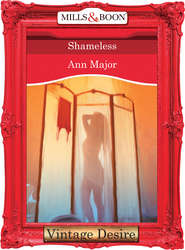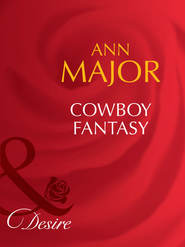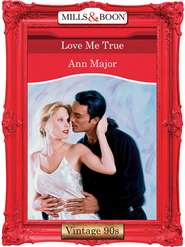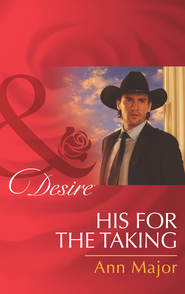По всем вопросам обращайтесь на: info@litportal.ru
(©) 2003-2025.
✖
The Accidental Bodyguard
Автор
Год написания книги
2018
Настройки чтения
Размер шрифта
Высота строк
Поля
loves writing romance novels as much as she loves reading them. She is the proud mother of three children who are now in high school and college. She lists hiking in the Colorado mountains with her husband, playing tennis, sailing, enjoying her cats and playing the piano among her favorite activities.
Dear Reader,
I am very thrilled to be part of the CELEBRATION 1000 for the Silhouette Desire line, and I hope each of you will enjoy The Accidental Bodyguard.
My books always seem to me to be like patchwork quilts. I mix my experiences and reactions with the stories other people tell me and the things I read, and out comes a story. Not that this is an easy process. Not that when I am done I can’t still remember the agony of every bad idea and every ripped-out seam.
My husband is a doctor, and I had originally intended to write a story about the skeleton of an Indian girl that hangs in his office. I remember when a great big crate from India arrived—years ago—and we went up after work with the children and pried the lid off the carton. We found a beautiful, carefully packed skeleton inside. My husband said she couldn’t have been older than eighteen when she died. We were all deeply awed as he gently lifted the skeleton out and we all wondered who she had been and how she had lived.
This book began with my questions about that girl, and I thought I would be writing about a skeleton coming to life and changing a doctor’s life. But as I began to research the story and read about reincarnation, I began wondering about other mysteries.
Why do we sometimes feel we know a person instantly? Why do new patterns and new places sometimes feel so familiar? Why do some souls seem so much wiser than others? How can a person fall in love instantly? As you will see, there is no skeleton in my story. When I sat down to write, my imagination twisted and turned and I wrote an entirely different book than the one I had envisioned. But what stayed the same was my great curiosity about life and death and the boundaries of love.
Enjoy.
Prologue
“Chandra is a conniving little do-goody bitch!” Holly said.
The rest of the family, which included, among others, Holly’s parents, Ned and Sandra Moran, as well as her husband, Stinky Brown, and his brother, Hal, nodded in silent unison.
Lucas Broderick stopped scribbling on his legal pad and lifted his head to observe the young woman who spoke so vehemently against the cousin who was to gain control of the Moran fortune.
Holly Moran. had chocolate-dark curls, an hourglass figure and a flare for drama a trial lawyer such as Lucas couldn’t help but envy. She still had on the black sheath and the rope of pearls she had worn to her grandmother’s funeral. But the dark eyes that locked with Lucas’s were clear and lovely, unmarred by any trace of grief as she let him know that even though she was married, she was hot and…available.
A billion dollars was one hell of a turn-on. Well, almost a billion, give or take a hundred million or two.
Holly was as dropdead gorgeous and just as dropdead mean as his ex-wife, Joan, had been. Holly had that too-bright glow of a woman who hadn’t yet settled comfortably into marriage. For half a second, Lucas, who was lonely for the kind of pleasure a woman like Holly could provide, was tempted.
Then his rational mind clicked in.
Been there. Done that.
His steel-gray eyes glittered as he gave her an ironic smile. Been taken in by that act before, pretty lady.
The last thing he needed was another Joan. His ex-wife had given him the shaft and taken him to the cleaners as nobody had since he’d been a green kid. As no woman ever would again.
He’d given his heart to Joan, and she’d ripped it out while it was still beating. She had taken most of his money, and she’d done a number on their sons.
His enemies said he had no heart. Who needed one?
Holly’s silky voice grew more vicious, not that she was addressing anybody in particular. “I tell you her do-goody act was all fake. How could Gram have left everything to her?”
“Not quite everything,” Uncle Henry dared to object. “Gertie did leave each of us two—”
Of the four voices that shouted him down, Holly’s was the softest, and the angriest.
“She might as well have! You may be able to get by on a lousy million or two since you’re content to live in that miserable unair-conditioned shack on your godforsaken farm like a hermit.”
For three hours the Morans had been ranting about Gertrude Moran’s will in the ranch house’s richly paneled library while Lucas, their legal hired gun, had reposed in a deep leather armchair, listening impassively as he watched the clouds move in and thicken against the distant horizon. Occasionally he wrote down a note or two on his yellow pad, which he would probably never so much as glance at again.
Much had been written about the rugged, legendary lawyer who was now sprawled in the library’s most comfortable chair in scuffed boots, faded jeans and a crisp white shirt. But the majority of the press coverage was false.
Lucas could have told the Morans a thing or two about poverty, more than they wanted to know, more than he wanted to remember. For he had been born in India to an impoverished missionary. His father, a zealot and an idealist, had forced his family to live in the same dangerous, squalid slums as the people he helped. Then the old man had given all his love and attention to the impoverished Indians.
Left alone to fend for himself in dangerous neighborhoods, Lucas had been beaten by jeering gangs of bullies more times than he could count, his meager possessions stolen, his emerging male self-confidence shattered. His father’s response had been to feel sorry for the young criminals and to tell Lucas to turn the other cheek. Lucas had sworn that when he grew up he would be the fighter and the taker. He would hit hard. Others could turn the other cheek.
But Lucas’s real roots were something he worked very hard to conceal. He didn’t want anybody to know that he harbored a deep-rooted feeling of abandonment and poor self-esteem. He wanted people to think he was tough and cruel—a winner. So he manipulated his public image as ruthlessly as he manipulated the minds of jurors when he made them believe the most preposterous arguments, or as easily as he convinced clients like the Morans they couldn’t possibly get what they wanted without him. His profession was a highstakes game, which he always played to win.
Texas journalists loved to quote him. “God may have created the world, but the Devil put the spin on it.” “Ten thousand times more crimes have been committed in the name of love than in the name of hate.” “No good deed goes unpunished.” These cynical if less than original statements, which seemed to sum up his philosophy about life, had appeared in dozens of profiles of him in Texas magazines and newspapers.
He was widely hated and only grudgingly admired. Flamboyant quotes were hardly Lucas’s only talent. He was a superb athlete, and he excelled in mathematics. He automatically converted everything into numbers—especially his time, that being to him the most valuable of all commodities because, once it was gone, it was gone forever.
Since all Lucas’s clients bombarded him with tales of woe, he usually found these long preliminary consultations tiresome, especially if he was expected to fake compassion. But the Morans’ tale was too bizarre and their threatened fortune too huge for their story not to compel his full attention. He was struggling to pretend sympathy. What the hell? He’d sold himself before for a lot less than a billion.
While Holly attacked Stinky for always taking Beth’s side and not seeing her as a threat before today, Lucas reviewed his notes.
The family’s do-goody dark horse, a Miss Bethany Ann—he’d made a scribble that she wanted to be called Chandra—had come from out of nowhere and galloped away with the family fortune.
Both the girl and her story intrigued him. He furrowed his black brows as he tried to read his nearly illegible scrawl.
Bulk of fortune goes into charitable foundation. Complete control given to Miss Bethany Ann.
Weird little girl. Prematurely born in Calcutta when her mother and father were on a round-the-world tour.
India—so he and she had been born in the same hellhole.
An oddball from birth, she was claustrophobic. She was also a vegetarian who refused to eat beef. Never fit into the family. When she was two and had begun to talk, she’d told her family that her name was Chandra, not Beth. She had babbled frantically of memories of another life and of belonging to another, poorer family. When she grew older she said her enraged older sister, in an effort to save the family from shame, had shut her inside a box and buried her alive beneath a house when she found out Chandra had gotten pregnant by the town’s local bad boy whom she loved instead of her betrothed.
Under hypnosis Chandra had spoken in a foreign language that a language expert at the University of Texas had identified as an obscure dialect of Hindi. Upon investigation, a family in a remote area of India where this dialect was spoken had been found. Names, dates and facts of this family’s history exactly fit Chandra’s story.
Gertrude and all the Morans had flown to India. A seven-year-old Chandra had led everybody to a ruined house and insisted they dig up a brick floor. Chandra’s former sister, a woman by then in her midfifties, had burst into guilty tears when a crumbling box with the bones of a young girl and those of her unborn child had been discovered, and Chandra had accused her of burying her alive. The grave of the dead girl’s bad-boy lover was visited next. Apparently he had stepped in front of a train and had been sliced to death shortly after he’d been told that the dead girl had run away.
Weird. Lucas, who knew more than he wanted to about India and reincarnation, had underlined the word three times. This girl, Bethany, Chandra, whatever, had wanted to share the Moran money with those less fortunate. Understandably alarmed, the entire Moran clan had been determined to erase the inappropriate “memories” and eradicate such inappropriate attitudes. They had taken the little girl to countless doctors, psychologists, and finally to a hypnotist who was no help at all, since he had said this looked like a genuine case of reincarnation if ever there was one. He pointed out that Chandra’s claustrophobia was perfectly natural under such circumstances.
Gertrude Moran had fired the hypnotist on the spot and refused to take the child to any more “charlatans.” After Bethany’s parents had been killed in a car accident, the old lady had done everything in her power to make the girl forget her “former life” and mold her into a true Moran. But the impossible child had been kicked out of every fancy boarding school she’d been sent to, and the old lady had had to take charge of the girl’s education herself. Gertrude had taken the child everywhere and taught her about investments, real estate, bonds, ranching and stocks.
But apparently the shape of Bethany’s personality had been as difficult as the old lady’s. Not that the girl hadn’t appeared gentle and loving and generous and biddable. But no matter how intelligent and receptive she had seemed on the surface, her character had been as true to its own shape as the most uncarvable stone. She continued to sympathize with those less fortunate than she. At the age of twelve she had her name legally changed to Chandra. As she grew older she had a tendency to date bad boys—because she said she was looking for the man she had loved in her former life. When she was eighteen and on the brink of marriage to Stinky Brown, a slick charmer Gertrude Moran had considered totally unsuitable, she and her grandmother had had a disastrous quarrel. Chandra had broken off with Stinky and run away without a dime, never to be seen or spoken of or to again.
Until now.
For a fleeting moment Lucas felt an unwanted respect for a girl who could stand up to Gertrude Moran and walk away from such a huge fortune. Then he reminded himself there was no such thing as selfless good, that somebody always paid.
Lucas’s last words on the yellow page were Holly’s. “The conniving little do-goody bitch. I tell you her do-goody act was all fake.”
Could be, pretty lady. Fortune hunters and con artists damn sure came in all sorts of interesting shapes and varieties. But this kid with the innocent face and the freckles and the masses of golden hair was damn good.
Lucas lifted a picture of a seven-year-old girl standing before a hut in India with her “other family.” Next he looked at a grainy black-and-white newspaper picture of her standing beside some look-alike heiress buddy named Cathy Calderon. They both wore ragged jeans, steel-toed work boots and hard hats as they posed in front of a concrete blockhouse one of her church groups had recently completed for a Mexican family.











